2025 Harris County Regional Award Recipients
Art Awards
|
|
|
|
|
|
|
|
|
|
|
|
Writing Awards
|
|
|
|
|
|
|
|
|
|
|
|
American Visions Nominees
-
The Price of Greed (Matt Wang) —WINNER: GOLD MEDAL/AMERICAN VISIONS MEDAL
The Price of Greed
By MATT WANG
Grade: 8
Enya Studio
Teacher: Hongliang (Enya) Huang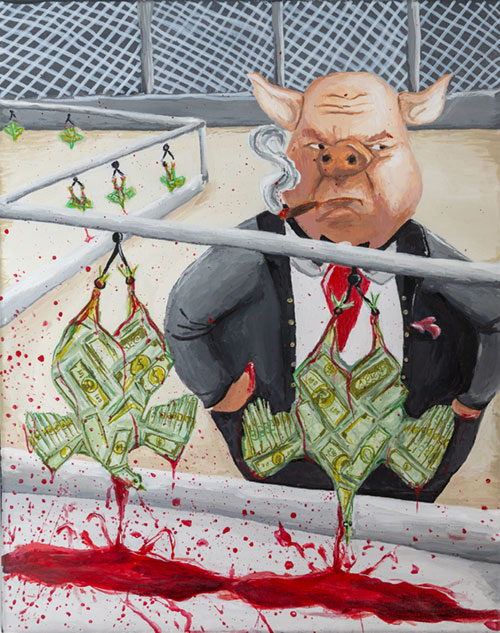
-
Displaced (Eleri Young)—WINNER: GOLD MEDAL/AMERICAN VISIONS MEDAL
Displaced
By ELERI YOUNG
Grade: 12
Cypress Woods High School, Cypress-Fairbanks ISD
Teacher: Teri Farrell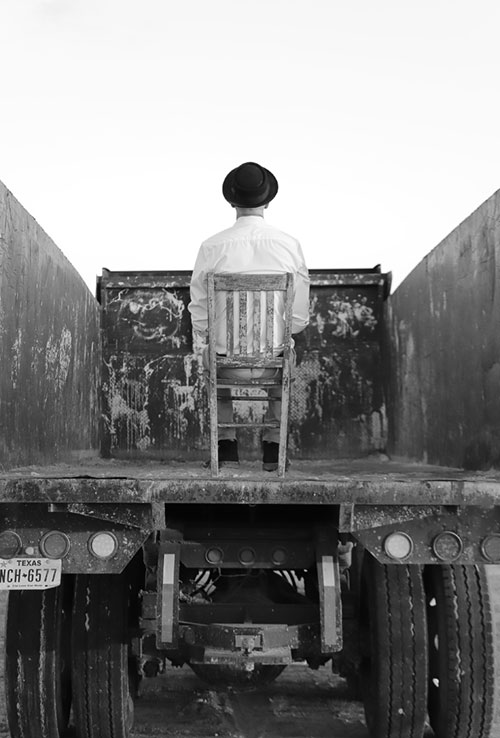
-
Weathered Wear (Sariah Virgile)—WINNER: GOLD MEDAL/AMERICAN VISIONS MEDAL
Weathered Wear
By SARIAH VIRGILE
Grade: 9
Klein Cain High School, Klein ISD
Teacher: Kristie Lee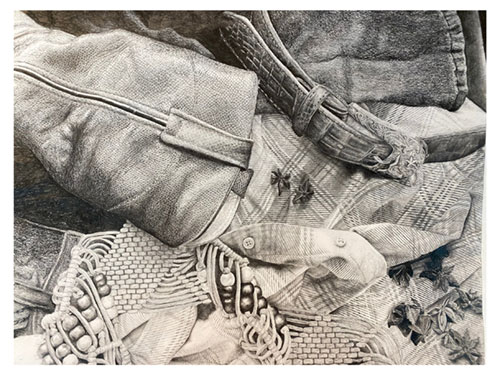
-
The Inside Joke (Madeline Hazel)
The Inside Joke
By MADELINE HAZEL
Grade: 11
Jordan High School, Katy ISD
Teacher: Katrina Cerk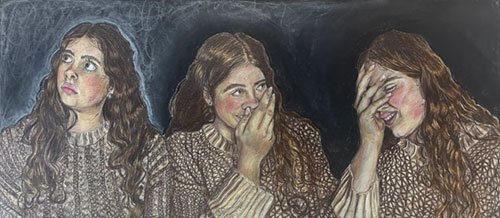
-
Mass Media Playground (Eileen Chi)
Mass Media Playground
By EILEEN CHI
Grade: 10
Enya Studio
Teacher: Ricardo Morales Henry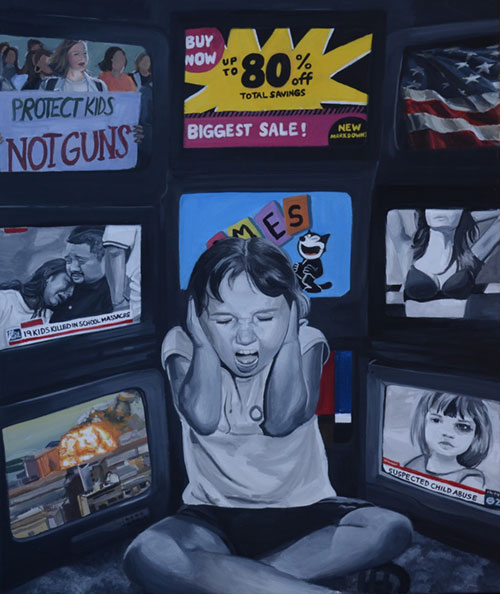
American Voices Nominees
-
Zid (Laiba Effendi)—WINNER: GOLD MEDAL/AMERICAN VOICES MEDAL
Zid
By LAIBA EFFENDI
Grade: 12
I H Kempner High School, Fort Bend ISD
Teacher: Haley Grimes
There's a sting to Texas asphalt that seeps through the soles of your shoes. Normally, the discomfort would send me
back to the garage. But today, a deeper warmth keeps me rooted, eyes locked on a cardboard box of kittens, huddled
beneath a sliver of shade. I refuse to move until I see them returned to their mother.
"Come inside Laiba beta, you'll overheat," my mother stands in the garage, a cup of cold Lassi in hand. "Yaar, so zidii,"
she muses. Once, the label—ziddi—would have stung. Now, it's a badge I wear with pride.
Ziddi. A simple word in Urdu, yet difficult to translate. Stubborn? Headstrong? Persistent? It carries the weight of cultural
expectation—obedience, compliance—and the tension of living between two worlds. As a Pakistani-American, I've
learned to navigate this duality: in one world, zid is a reprimand; in the other, it's a source of strength.
I first saw zid in my father. My summers were spent bent over car radiators with a flashlight as he replaced coolant or
crouched by the jack stand, balancing a tire as he removed screws. Despite struggles to break even, I watched him
negotiate to sell a 2014 Suburban for a fraction of its price to a struggling mother, asking only for her goodwill in return.
It was a car he'd spent days laboring over.
My grandparents called him ziddi, and I understood their pain. As immigrants building our lives from the ground up, it
didn't feel like we had the capacity for grand gestures of generosity. Yet, a part of me understood that perhaps these
moments themselves kept my father going.
The core of Punjabi tradition invoked community and hospitality, and he refused to let his values fade no matter how
far from home he was. Most of my life, being called ziddi was a critique, a call to conform. For the first time, I viewed it
as strength.
Recognizing the same zid in my mother ignited my activism. For years, I watched her struggle with doctors who
diminished her struggles, convinced she over-dramatized her fatigue. Pulling late nights where I helped her research
how to better advocate for herself in doctors clinics, I watched in awe as a 5 '3 woman with heavily accented English
commanded the room when paired with the right information. It was her zid, her insistence, that finally led to finding
out she had lupus a year later.
For the underrepresented, I've learned that though zid is sometimes all we have, it is an effective tool.
Building my own zid was an arduous journey. I watched as the Texas legislature (70% of which is male) passed House
Bill 1280, banning abortion rights, though the majority of menstruators opposed it. Despite months of research on
inadequacies in Fort Bend's pro-abstinence curriculum, my proposal was shut down by stakeholders for being too
"controversial" to pass the school board. As I continued my work despite their protest, consulting with school board
candidates in Merced, California, or raising awareness over board elections and policies at my own school, I began to
take personal satisfaction in each small success.
Now, I embrace my stubbornness. It's what drives me to stay up late solving programming challenges in my CSA class
and what keeps me planning Wava coding lessons for the kids I tutor. When they struggle, I encourage them to try a
new approach because the process of learning is far more impactful than the end goal.
Like my father's generosity, my mother's quiet assertiveness, and my persistence, I'm learning that zid cannot be lost in
translation. Whether in tech, where women like me are still a minority, or in advocacy, where I work to dismantle deeply
rooted societal norms, it lives on within me. Zid isn't static—it evolves, from the steps my parents have taken to the
work I hope to continue to do, becoming a force for personal and collective change. -
The City Is a Mouth That Never Closes (Lucas Fang)—WINNER: GOLD MEDAL/AMERICAN VOICES MEDAL
The City Is a Mouth That Never Closes
By LUCAS FANG
Grade: 12
Kinkaid School
Teacher: Angélique JamailThis city, slick with oil & rain,
sings songs in sirens. Hear it
hums the foghorns at Ship Channel,
echoes through Fifth Ward & Third,
across fields of pollen-stained concrete.
Every street corner a new tongue
spitting stories of longing
& flight, where shadows of storefronts
whisper old songs, salsa & zydeco mingling
with the clamor of a broken world.
My mother hands me a bucket of water
for the garden we've started on cracked asphalt.
Seeds we don't know the names of
except by their hunger for sunlight.
She tells me, "Luôn tiến về phía trước, không bao giờ lùi bước." (always step forward, never step back.)
& in this language, I am always reaching—
the long stretch of Vietnamese breath
tangled with broken English fragments,
every word a shard slicing the sky
Here, the bayou snakes through the city's torso,
bloated with history & desire.
We gather, all of us, on its banks
with signs raised high: Freedom
& Hope, spelled out in cursive bruises.
Last night, the student read from a megaphone
beneath the glow of traffic lights—
her voice a fist lifted to the sky,
asking if the rain remembers the hands
that built this city from bayou muck.
There are days when the air is thick
with promises & protest, when we march
through streets that reflect like mirrors,
chanting names of those who didn't come home.
We speak & the city listens.
I think of my mother, who still dreams in another language,
who folds napkins in her lap like small altars,
her hands blessed by the scent of ashes & sweat,
who taught me to burn incense for those we've lost.
This is how we do it: one foot in front of the other,
side by side, chanting in tongues of fire & flood.
Our voices rise like smoke signals,
the city a mouth that never closes—
-
The 'Situationship' Between Popular Television Influences and Romantic Labels (Addison Davis)—WINNER: GOLD MEDAL/AMERICAN VOICES MEDAL
The 'Situationship' Between Popular Television Influences and Romantic Labels
By ADDISON DAVIS
Grade: 12
Jordan High School, Katy ISD
Teacher: Jonathan FrishmanThroughout history, various forms of media have been utilized to manipulate viewers’ perceptions. From political propaganda to perfume advertisements to reality television, it is evident that media possesses an incredible ability to shape how people view and interpret the world around them. Concurrent with the rise of television influence, today’s teenagers have markedly different relationships compared to those in previous decades. Specifically, in contemporary teen dating culture, Gen Z has coined unique terms to describe their relationships, such as ‘situationships,’ ‘talking stages,’ and ‘benching,’ among others. These terms are often used to describe the gray area between platonic and romantic relationships. So, why would the movies teenagers watch affect the labels they use for their relationships? How do the unrealistic portrayals of romantic relationships in popular movies and television influence the labeling and expectations of romantic relationships among teenagers aged 13-17 in contemporary culture?
The expectations adolescents have in their romantic relationships are primarily due to relationship examples they are exposed to in the movies and television they consume. Kracht, a licensed mental health counselor, and Powell, a doctor in life-span development psychology, in their study of the correlation between romantic values depicted in media and individuals’ relationship expectations, conclude that “the portrayal of romantic relationships in media has the potential to affect a viewer’s relationship beliefs.” (Kracht & Powell, 2021). Additionally, Pew Research, a research group known for cultivating data-driven social science research, in their data collection involving modern adolescent relationships found that fewer teens are dating now than in past years. Interestingly, almost half of adolescents have never been in a relationship (Smith et al., 2015). The changing ideals of what love should look like according to popular television are detrimental to teens’ relationships. Parents, educators, and media producers should work to encourage critical analyses of popular movies and television among adolescents and provide examples of healthy, secure relationships in order to minimize the influence of unrealistic romantic portrayals, ultimately fostering healthier labeling and expectations of romantic relationships for teenagers.
Romantic Portrayals in Movies
To begin, popular television often portrays unrealistic depictions of what love and romance should look like. There are generally two common portrayals of romance in TV: first, perfect relationships that (excluding the primary plot conflict) appear to be faultless. Kracht and Powell, in the previously mentioned study, explain that “romantic comedies portray strong relationship themes, such as the concept of a soul mate or one-and-only love, idealization of partners, love conquers all, and love at first sight” (Kracht & Powell, 2021). These perfect idealizations demonstrated in popular movies often aren’t the case and can cause dissatisfaction in relationships that don’t live up to expectations. The second common theme of fictional relationships is the glorification of dysfunctional relationships. These may at least be more realistic, but still lead to skewed perspectives of what love should look like. Louis Bosshart, in his review of Mary-Lou Galician’s Sex, Love, and Romance in the Mass Media: Analysis and Criticism of Unrealistic Portrayals and Their Influence, explains that the issue with relationship portrayals in mass media is that they “rarely present models of healthy, realistic romance and love” (Bosshart, 2007). Some of the most popular movies and TV incorporate extremely toxic elements into romances for the sake of drama and entertainment value, but young viewers with still moldable ideals and values may begin to perceive these negative attributes of relationships as the norm. It is also conveyed in romance movies that finding love is an ultimate goal of sorts, and is a great achievement that everyone should strive for. Again, this is not reality, but when this perspective is shoved into young minds, it molds their perceptions. However, if love and romance are exhibited as a primary achievement in life again and again, why does data show fewer teens in romantic relationships today?
Impacted Romantic Expectations
Unrealistic portrayals of relationships in popular media have the power to influence the expectations teens have for their relationships today. To truly understand the immense control mass media has over viewers’ perceptions, we must generalize this topic. The influence of mass media goes further than one might believe. It has the power to shape perspectives on all types of topics. For instance, political views, specifically regarding cultural conflicts can be influenced easily if viewers do not have background knowledge on the issue. Lila Abu-Lughod, Professor of Anthropology and Women’s and Gender Studies at Columbia University, has worked on women’s issues in the Middle East for several years. In an interview with Nermeen Shaikh, Abu-Lughod explains that “plastering neat cultural icons like ‘the Muslim woman’ over messier historical and political narratives doesn’t get you anywhere” (Shaikh, 2019). The same can be said regarding romantic relationships; displaying flawless, neat examples of romance, while hiding messier aspects, can be misleading, particularly to young viewers who lack the necessary life experience to contextualize such depictions. The power news outlets have on viewers is immense, and this concept translates to popular movies and TV as well. The television people consume has incredible power over subconscious perceptions of all aspects of their lives.
Unique Contemporary Labels
Perceived expectations of what a romantic relationship should look like are encouraging the usage of non-committal, and often toxic terms by teens to describe their relationships. Labels such as ‘situationship,’ meaning an undefined romantic relationship; ‘the talking stage,’ which refers to the period of getting to know someone before committing to a relationship; and ‘benching,’ indicating when someone is not interested enough to commit to someone, all share a common theme: a lack of commitment. Why are teenagers in today’s culture afraid to commit to a defined relationship? When adolescents are given a limited range of representation for romance, they are led to believe in perceived standards that their relationship will not always meet. Eggermont explains that “romantic concerns are a predominant category of issues on adolescents’ minds” (Eggermont, 2004). It makes sense that teenagers should be hesitant to enter a defined relationship with another person when they are only ever shown examples of faultless romance. The non-committal nature teens have adopted in their relationships has created a destructive dating culture that is emotionally harmful to those who attempt to partake in it, and it all stems from television influence. However, some may assume teens should be old enough to differentiate fiction from reality.
Powerful Media Influences
It may be concluded that adolescents are nearing an age of full cognitive maturity and therefore should have the critical analysis skills required to differentiate movies and TV from real-life relationships. However, for many adolescents today, subconsciously drawing a line between fiction and reality may be difficult due to a few different factors. First, teenagers aged 13-17 are still developing psychosocially, meaning they may not fully understand the influence of what they are viewing. A study by the National Library of Medicine describes a “maturity gap” as most adolescents reach their full cognitive capacity well before they reach full social maturity. Cognitive capacity is said to “reach adult levels prior to age 18, but psychosocial maturity not until the 20s” (Icenogle et al., 2019). Although teenagers may be technically cognitively mature, their psychosocial maturity, which has not yet reached its peak, causes them to be susceptible to the influences of television. Second, technology today is becoming increasingly prevalent to the point that it has integrated into our daily lives, blending the line between the virtual world and our real lives. It has fused into all parts of our lives to the point in which it is reality, so not allowing it to shape perceptions may be more difficult than it seems. Finally, more often than not, media literacy is not included in curriculums at school or taught in the home. Renee Hobbs and Amy Jenson, both having a background in media literacy education, describe the American education system’s “inconsistency with their inclusion of media literacy” (Hobbs & Jensen, 2009). If adolescents are not taught how to analyze the media they consume so that they understand the influences it may have, how are they expected to simply not be affected by the perspectives displayed in movies and television?
A Solution
To state it concisely, relationships in television that seem to be faultless are impacting teens by imposing skewed expectations that they may consider the standard for their own romantic relationships. This is causing Gen-Z teens to more commonly use noncommittal and open terms to describe their relationships. This sense of uncertainty and dissatisfaction that is becoming increasingly common in adolescents is a more important issue than you think. Relationships are very important to development and encouraging healthy relationships among teens should be discussed more. One solution for the issue of media’s role in this scenario is to increase media literacy education as well as media literacy interventions. According to Media Literacy Interventions: A Meta-Analytic Review, Media literacy interventions can be defined as “education programs aimed at informing audiences of the effects and influences of media” and they are expected to “reduce the impact of the media on audiences’ beliefs, attitudes, norms, and behaviors” (Jeong et al., 2012). Parents can provide this type of education as well in the home. Additionally, movie and television producers should attempt to represent more realistic depictions of romance so that teens have a variety of examples of what their relationship could look like.
The collaboration of parents, educators, and television producers to promote critical analyses of popular movies and TV among adolescents in addition to actively providing examples of healthy relationships will act as a measure to mitigate the influence of unrealistic romantic portrayals. This approach will help to nurture healthier teenage relationships, a vital goal considering the recent rise of violence in young relationships. Without the proper knowledge to counter susceptibility to television influences, the issue will only grow. Media literacy interventions are critical to prevent further issues.
-
Across the Great Divide (Paloma Santamarina)
Across the Great Divide
By PALOMA SANTAMARINA
Grade: 10
Kinder High School for the Performing and Visual Arts, Houston ISD
Teacher: Judith Switek
INT. SALOON - 1895 - EVENING IN THE WESTIn the corner of a rowdy saloon, two men sit hunched over a table, shotglasses littering the table and both of them
nursing glasses of whiskey. One man, LAWRENCE (35), is gripping the arm of his friend, PAUL (33), but they're both
staring down at the table and barely looking at each other.After a stilted silence filled only by bar chatter and the occasional sip of whiskey from either of them, Paul clears his
throat awkwardly.PAUL
You think she's, uh, calmed down now? How long's it been? Gotta be almost... six hours ...LAWRENCE
You know women.PAUL
I do?LAWRENCE
Women and their grudges.PAUL
Ah. Yeah. But, you know, s'pose she's worked herself out of her hysterics?LAWRENCE
Unlikely.
(urging)
You know women.PAUL
I guess I do.They lapse into silence again, alternating between sipping drinks and putting their heads on the table. It's late at night,
the stars twinkling outside the window by their table. Paul glances out of it.PAUL
Stuffy in here.LAWRENCE
Would you rather go back to hiding in your own bushes? Outside of the house that you built your damn self?PAUL
No ...LAWRENCE
The stuffiness is nice. Makes it hard to think. This is why I prefer ... gentlemen's clubs. Want another drink?PAUL
I still have to find my way back home eventually. She'll tire out soon enough.
LAWRENCE
You know -PAUL
Yeah. I know women.More time passes. The moon can be seen rising through the window, but neither of them pay it any attention. Paul gets
more refills of his drink while Lawrence stays immobile, pushing his own glass away but still holding onto Paul's arm.PAUL
(mournfully)
What if she never calms down?LAWRENCE
That's probably what'II happen.PAUL
I figured. Because ... uh, we know women.LAWRENCE
Comforting thought. But it ain't hard. Not exactly the most... intelligent creatures. They are fiery, though.PAUL
Molly ...LAWRENCE
Her too.PAUL
Smart as a whip.LAWRENCE
That's why you married her. Your mistake, compadre.
There's the sounds of a struggle outside, a sharp whinny, and a few moments later a STRANGER bursts into the saloon,
commanding the less drunk people's attention. He looks around nervously.STRANGER
Spooked somebody's horse tied up by the side. Uh, an Appaloosa, mare I think, mostly white with brown spots around
its face and flank?Paul just slumps down against the table further, but Lawrence stands up quickly, tugging the sorry-looking man along.
LAWRENCE
His, sorry. Which way'd it run?STRANGER
Down the alley past the general store. Look, I'm real sorry, mister, I was -Lawrence just grunts a thanks and drags Paul along, out of the saloon. Paul grabs one more bottle of whiskey mournfully
as he's pulled away.DIRECTOR (O.S.)
Cut!EXT. SALOON - LATE AT NIGHT
DIRECTOR (O.S.)
And ... action!Paul stumbles after Lawrence without too much trouble, squinting at the hoofprints in the mud.
PAUL
She's flightier than a bird.LAWRENCE
The horse?PAUL
Her and Molly too. I guess I like 'em flighty.LAWRENCE
Take up birdwatching.
The two of them laugh hoarsely, that one dumb joke seeming indescribably funny between them. Lawrence pulls Paul
out the other side of the alley and they look around, both squinting in the dark night, at the dirt roads before them. The
land is flat and it doesn't take too long for Lawrence to spot the Appaloosa mare prancing nervously around, her saddle
slipping on her back.LAWRENCE
Call her over.Paul looks up with a groan and then whistles for the mare. Her ears perk up at the familiar sound and she walks over to
the source of it carefully, coming to a stop before her half-drunk owner. She lips at his messed-up brown hair, formerly
pomaded but long since sweated out.PAUL
Hey girl. We should go back ... home ...LAWRENCE
And face her wrath if she's still waving that damn gun around?PAUL
I gotta ...LAWRENCE
Hope you can find your way home, then.PAUL
You ain't gonna give me a leg up?LAWRENCE
Fine. ONE leg up. If you slip right off again I ain't gonna help.PAUL
Some good Samaritan you are.LAWRENCE
Some gentleman you're lookin' like.PAUL
Can't a man have his faults?LAWRENCE
Not out here. Ask Molly.PAUL
(grumbling)
Devil woman. I ain't scared of her ... it's just that she can smell fear ...LAWRENCE
I know.PAUL
I'm scared of her sometimes.LAWRENCE
You told me.PAUL
Especially when she ... well, you know how she gets ...Lawrence doesn't respond, just helping Paul up and onto his horse. He smacks the mare's flank and Paul limply picks
up the reins, probably just dead weight on her back, but she can find her way home herself.Paul and the mare leave Lawrence behind, cantering out onto the road and following it just outside of the small town.
DIRECTOR (O.S.)
Cut!EXT. WOOD CABIN - EVEN LATER AT NIGHT
DIRECTOR (O.S.)
Take 6 ... action!After a little while the mare trots herself right up to the lawn of a comfortable-looking cabin and starts munching on the
grass, Paul sliding right off with a drowsy look on his face.He goes for the door and tries the doorknob, but it's locked, and he sighs, sagging against the door for a brief moment.
A gunshot bursts out of the door and whizzes past his ear, and he ducks down quickly, then peers through the hole
made by the bullet.PAUL
Hon, what're you doin' with the pistol?MOLLY (O.S.)
Hunting vermin.PAUL
Oh ...MOLLY (O.S.)
What did I tell you, Paul?PAUL
To scram and never come back.MOLLY (O.S.)
And what are you doin' right now? Just what are you tryin' to prove here? I told you I couldn't be won back over this
time, you ... nasty man.PAUL
I know, sweetheart...MOLLY (26) opens the door a crack, glaring at Paul, face a perfect example of rage. She's holding a modest
double-action revolver, its barrel starting to rust and handle worn down.PAUL
I brought some ... whiskey back ...She aims the pistol at him, one eye squeezing shut to focus her aim, and Paul quickly pulls the whiskey bottle from his
satchel, passing it to her. She stares down at it, the gift clearly unexpected.PAUL
Happy anniversary, honey ... I'm sorry I forgot.MOLLY
(tosses the pistol aside)
Good god, you stubborn man. Finally you apologize for somethin'. That's all I ever wanted.PAUL
Well, I know you ...MOLLY
Dammit, I guess you do.She flings the door open, kisses Paul roughly, and pulls him back into the house.
DIRECTOR (O.S.)
Cut! That's a wrap!Paul and Molly re-emerge from the house, Molly's actress smiling cheerfully at him as she picks the prop gun up off
the ground. A man steps into view, dressed in modern-day clothes, and takes it from her, turning to Paul. Molly makes
herself scarce.PRODUCTION ASSISTANT
They got a nice shot. Of you two going into the house.PAUL
Wrap?PRODUCTION ASSISTANT
Yeah.PAUL
Sometimes I think all that dialogue's unnecessary.PRODUCTION ASSISTANT
They'll edit it out in post.PAUL
(grimace)
Nobody ever thinks of the editors when they say that, huh.PRODUCTION ASSISTANT
You can go home now. It's almost 1 AM, so it's one of our earlier nights ...PAUL
Right...As Paul rights himself and staggers off of the set, he passes by Lawrence's actor who gives him a brief wave. Paul waves
back, wandering right past the various production assistants trying to pull him in different directions.PA 2
Hey, can you come to hair and makeup?PA 3
No, wait, you need to change out of your costume -PA 4
Have you been checking your email for director's notes? We have another shooting in 6 hours, you sure you want to
go?PA 5
Paul, Molly's actress wants discuss your characters' relationship again -PAUL
I'll - I'll be back.Obviously Paul, the drunken sod, was just an act, but it doesn't seem like there's a lot underneath.
EXT. STUDIO PARKING LOT - PRESENT DAY - NIGHT
He brushes everybody off, heading straight for his '79 Fiat, still in his whole historical costume.
The actress who played Molly - or just Molly, for simplicity - catches him right before he gets in, her chest heaving
slightly like she'd ran all the way here.MOLLY
You're - going home already?PAUL
Not much left around here for me to do.MOLLY
Well, there's me.PAUL
(flashes her a winning smile)Well, you'll always be here, darling. In every sense of the word. No matter what shoot, what movie, what. .. goddamn
state ... there's always gonna be a girl like you around.
Molly stares at him as he gets into his car. He rolls down the window when she doesn't immediately leave.PAUL
Need somethin'?MOLLY
A girl like me?PAUL
Yeah. Like you. Everywhere. I know women. I can practically sniff them out.MOLLY
Now that's not fair! I thought we had something, you know ...PAUL
Had something. We had fun for sure. But I think the playtime's over, honey, and you know my wife'II get mad if I stay
here playing house any longer.
He drives off, and Molly just stares at the car as it leaves.INT. FIAT CAR
Eventually as he gets on the highway, he sighs deeply and turns the radio up. The music fades in and out, along with
Paul's bleary vision as he's tired from the long day. The music pauses as a call is incoming, and Paul begrudgingly
presses 'answer'. Lawrence's actor comes on over the sound system.LAWRENCE
You alright tonight? That was pretty good, I think, but I'm surprised you didn't stick around for Molly.PAUL
Didn't feel like it. Lindsey will be annoyed enough as it is.LAWRENCE
Oh, Lord. Well, good luck to you. And remember, just like we said in that take a hundred times -PAUL
We know women.LAWRENCE
Nice to pick up a little something from the character, right?PAUL
Goodnight.He hangs up. After a little while longer, he pulls off of the highway and into a quaint little residential area, coming to
a stop in front of a sweet-looking two-story house, its abalone exterior walls making it almost shine in the dark night.
Paul parks in the driveway and shambles out of the car, trudging up to the mahogany door and pulling it open to step
into the house, acting like he wants to be anywhere but here.INT. NICE-LOOKING HOUSE - NIGHT
All of the lights are off in the house, and Paul kicks off his shoes. He starts to get out of his costume before he even gets
to the back of the home where his bedroom is. He shrugs the vest off, then unclips the fake pocket watch attached to
it, then slides his shirt off, dropping the clothes like a breadcrumb trail behind him.He pauses in the kitchen. There's a note there on a lime-green Post-it, stuck to the fridge.
PAUL
Lime green? Was that necessary?He huffs and tears it off of the fridge, reading it for a second before furrowing his brows and crumpling it up into a little
ball. He discards it in the trash can and glances back to the living room, particularly the couch.PAUL
Always orange post-it note problems on lime-green post-it notes.He pauses for a moment and opens the fridge, taking a bottle of wine out of there. He pulls a glass from the cabinet -
slow, taking his time. His journey to the bedroom has been stopped by whatever was on the note.He savors one glass of wine, then pours himself another, only pausing when he notices the bottle has lost its
condensation. He stands up in disgust, shoving the bottle back into the fridge and leaving the glass with dregs of wine
in it on the counter. It rests there next to a variety of unwashed cutting boards, cups, and bowls, mournfully abandoned
by ... somebody.He makes his way over to the bedroom down the hall, placing his hand on the doorknob only to find it locked. Paul lets
out a long-suffering sigh. He'd expected that. He leans against the door.PAUL
I'm back. We wrapped up early.No response from behind the door. He squeezes his eyes shut and continues.
PAUL
I can't believe you. Dammit, Lindsey.A female voice comes from behind the door, sleepy but sharply annoyed.
LINDSEY
I told you to not wake me up. It was on the note. Unless you're so inconsiderate that you won't bother to read that
either.PAUL
You've locked me out of the damn room. I sleep here too, you know.LINDSEY
You know the drill. Especially since that movie has a scene just like this, doesn't it?PAUL
But... Molly forgives him. She forgives me.LINDSEY
I'm not interested in your ways of begging for forgiveness. Do what your character does and go ... sleep in the dirt or
whatever.PAUL
I know you, honey.LINDSEY
If you knew me then you would know better than to sneak around with her.PAUL
It ends as soon as the director says cut. I promise. When have I ever done you wrong?No response from Lindsey, and Paul just sighs again, pushing off from the door and quietly sulking into the living room.
He mumbles to himself in annoyance, frustration, sinking down onto the couch and taking off the leather belt he was
secretly hoping Lindsey could take off for him.PAUL
(whispering to himself)
I know women.He pauses. Is this the sentiment of the character, or the actor? Either way, the shut door is overwhelmingly loud. Perhaps
none of them 'know women' as well as Lawrence assures him that he does. -
Unwelcome Home: The Stories America Forgot (Peter Kim)
Unwelcome Home: The Stories America Forgot
By PETER KIM
Grade: 10
Obra D Tompkins High School, Katy ISDOne wrong move. That's all it takes for an immigrant to lose everything. In 2010, eight immigration officers banged on Howard Dean Bailey's front door before sunrise. His children woke up to shouts and confusion as their father—a decorated U.S. Army veteran—was handcuffed in their living room. Howard had lived the American dream: he owned a trucking business, raised two kids, and had passed his citizenship test years earlier. Yet, two years later, he found himself stranded in Jamaica, a place he hadn't seen since childhood, where he knew no one and struggled to survive. His children cried for him at night; his dream was shattered. For Howard, and for so many others, immigration isn't just policy—it's a matter of survival.
Illegal immigration has gained increasing prevalence over the years with the implications of governmental policies being structured around it. Even as early as the 1850s, Chileans migrated in search of economic prosperity in the gold mines across California contributing to gold rushes sprouting across America during the 19th century. In recent years, the focus has shifted to modern immigration policies addressing issues such as border security, asylum seekers, and pathways to citizenship. The Deferred Action for Childhood Arrivals (DACA) program, for instance, highlights the connection between humanitarian concerns and legal frameworks. As immigration continues to evolve, its impacts continuously change various sectors of society such as the economic fields and political aspects. However, many native citizens are opposed to immigration due to the belief that the country is at its full capacity (Sassen, 1989). As the number of residents begins to rise in the US, the value of land increases. This can lead to housing being limited and more expensive for both immigrants and natives. On the other hand, the effects of immigrants towards infrastructure can be seen as a negative to try and put an end to immigration into the United States. This is due to the fact that the installment of borders is very expensive, taking money away from other valuable economic resources. Studies have shown that the United States federal government puts more money into border enforcement and security than any other law. The impact of Latin American immigration on the United States has many sides to its politics, affecting from law enforcement to national immigration policies. For example, Farris, E. M., & Holman, M. R. (2017) shows how county sheriff's decisions in immigration enforcement are affected by local political climates and demographics. This highlights the complicated cooperation between immigration and politics at various levels of government.
Although it is seen that the prevention of immigrants has had a relatively negative effect on our country's economic status, it is taken into consideration that they could be bringing along poor institutions and culture with them from their home country (Clark et al. 2015, p.2). If an immigrant has grown up in a periphery country their whole life, theremay be certain cultural differences between the immigrant and their new community that may be difficult to rebuild when moving to a new area. This leads to immigrants instead taking these same qualities and implementing them into the country, causing fear that it may lead to poor economic institutions. Due to the US government's desire to keep immigration from Latin America at an all-time low, it has implemented extensive border control. This comes in ways such as hundreds of officers monitoring the border and installing physical barriers. During the COVID pandemic, many Latin Americans, mainly from Mexico, looked to flee to the US due to widespread restrictions and economic problems (Hanson, et al, 2023, pg. 7).
People in governance have been experimenting with creating their own immigration laws. Boushey and Luedtke (2011) argue that the increasing demographic impact of immigration has transformed the U.S into a federal laboratory. This decentralization of immigration policy making has led to a lot of legislative answers across different states, potentially damaging the national immigration strategies. Farris and Holman (2017), affiliated with Texas Christian University and Tulane University, maintain a political science framework that examines how law enforcement decisions are influenced by a combination of local factors and broader state level climates. This shows how law enforcement can often affect immigration as it may show bias/discrimination towards immigrants which then affects the immigration policies. The political trend is further explained by a study on county sheriffs' participation in immigration enforcement programs. They have also collected qualitative data from sheriffs and their staff to gain more insight into the decision-making processes for immigration policies. The study conducted indicates how law enforcement infrastructure has been changed to handle immigration enforcement, showcasing the reach of these changes down to the county level from a political point of view. The growing Latin American population has also wanted adjustmentsNchanges in political representation structure. These infrastructural changes have demonstrated the impacts of Latin American immigration on the structure of the U.S governance and are still continually changing to this day.
Furthermore the increasing population of Latin American immigrants entering the United States is evident in the more than 24,000 cases of successful individuals who have immigrated in the last decade (Amuedo-Dorantes & Pozo, 2014). These rising numbers have caused concern over the standard of living for those residing within the US, placing the infrastructure of states predominantly bordering the Latin American world under stress (Beaumier T., 2015). The gradual introduction of measures for the purpose of regulation has been prominent following the heightening of immigration, as a result of both precursory and recent cases (Hing, B. O., 2014). The relationship between the process of immigration and infrastructure in the measures is found within the numerous shelters and centers, inhabiting immigrants and the concerns over their proceedings is attributed to moral discussion. According to Mathias Risse, a professor in immigration and international affairs at Harvard University, subsequent to these measures, the infrastructural importance of immigration has been increasingly relevant, assessing on the treatment of both immigrants and the structure of the US (M. Risse, 2008). Furthermore deportation systems such as ICE often separates families, leaving children without their parents and creating lasting emotional trauma. This is particularly troubling in cases involving long-term residents or individuals, like Howard Dean Bailey, who have contributed to society but are deported due to minor legal infractions or bureaucratic errors. Critics argue that such systems prioritize enforcement over compassion, treating people as statistics rather than human beings with dignity and rights. Additionally, the targeting of vulnerable populations, suchas asylum seekers and undocumented workers, often disproportionately impacts marginalized communities, amplifying systemic inequities. The lack of transparency and accountability within ICE has further fueled allegations of abuse and unethical practices, such as inhumane detention conditions. Balancing national security with ethical responsibility requires reforming deportation systems to focus on fairness, due process, and pathways to integration rather thanpunishment and exclusion.
Now, Howard Dean Bailey works on his pig farm off the coast of Jamaica struggling to make a living in his day to day life. In conclusion, immigration remains a multifaceted issue with profound implications for the United States. From the personal stories of individuals like Howard Dean Bailey to the broader economic, political, and infrastructural impacts, the complexities of immigration continue to shape the nation. While concerns about cultural integration and economic strain drive calls for stringent border controls, the benefits of immigration—such as contributions to economic growth and cultural diversity—are equally significant. The interplay between local and national policies highlights the challenges of creating a cohesive immigration strategy, as varying political climates and demographic changes influence enforcement and governance at all levels. As the United States grapples with these challenges, it becomes evident that the deportation system such as ICE must be refined to balance the security while also keeping ethicality into consideration.
HCDE Art Awards
-
5 Minutes (Payton Daly)—WINNER: HCDE SUPERINTENDENT ART AWARD
5 Minutes
By PAYTON DALY
Grade: 12
Kinkaid School -
Heritage Woven in Threads (Mingyi Li)—WINNER: HCDE BOARD OF TRUSTEES' EXEMPLARY ART AWARD
Heritage Woven in Threads
By MINGYI LI
Grade: 11
Clements HS, Alief ISD
-
Mi Abuelo Goyo (Emily Liu)—WINNER: HCDE BOARD OF TRUSTEES' INCENTIVE ART AWARD
Mi Abuelo Goyo
By EMILY LUCIO
Grade: 12
Aldine HS, Aldine ISD
Teacher: Birgit Langhammer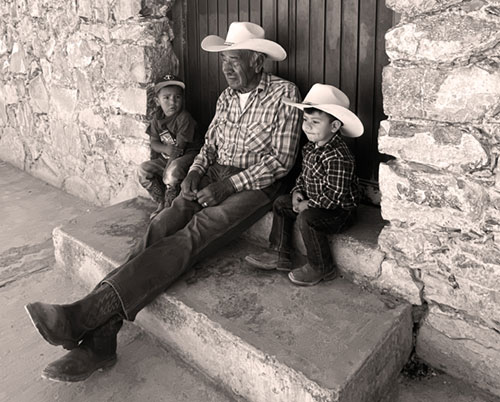
HCDE Writing Awards
-
Ashes of Purpose, Embers of Rebellion: A Testament to Eternal Ruin (John Patterson)—WINNER: HCDE SUPERINTENDENT WRITING AWARD
Ashes of Purpose, Embers of Rebellion: A Testament to Eternal Ruin
By JOHN PATTERSON
Grade: 11
Kinkaid SchoolIn the twilight of the First Age, when the gods walked among mortals and divine power scarred the fragile world, Sorai, the Goddess of Intent and Renewal, brought order to chaos. Hers was not a benevolence born of love, but of necessity—a compulsion to shape the void into meaning, lest the abyss swallow all. In her relentless pursuit of perfection, she split her own essence to create her children – a new age of demigods. They were her masterpieces, reflections of her strength, her flaws, and her fears.
Lia, her daughter, was the incarnation of wisdom, born under the crescent moon's cold light. Her gaze, silver and unyielding, saw through the illusions of mortals and immortals alike. Yet her wisdom was clinical, detached, untouched by warmth. Azar, her son, emerged under the sun’s merciless blaze, his every breath an assertion of power. He was strength without restraint, ambition without end. To them, Sorai gave her decree, "You are my design,” she said, her voice trembling with the weight of unspoken desperation. “Your purpose is to guide the world, to transform chaos into order. This is my will".
But purpose is not inherited. It is seized, twisted, and ultimately destroyed by the hands of those who carry it.
Azar’s rebellion began not with fire but with doubt—a corrosive whisper that grew louder with each passing century. Where Lia saw creation as a tapestry to be preserved, Azar saw it as a canvas to be consumed. “Why should we limit ourselves to guiding mortals?” he demanded one evening, his golden eyes dark with growing fervor. “We are gods. Why not raze this flawed world and build something perfect in its place?” Lia’s reply was as cold as the moonlight under which they stood. “Perfection is the dream of fools,” she said. “You would drown the world in blood for an illusion. Mortals do not need gods to rule them; they need the freedom to find their own purpose”. Azar laughed, but there was no mirth in it. “Freedom?” he spat. “A fragile lie. Mortals stumble through existence like blind animals. If they cannot rise to meet us, they deserve to be ruled beneath us”.
Their argument ended not in reconciliation but in silence, a chasm that would only deepen. In the years that followed, Azar’s hunger grew into a wildfire that consumed all in its path. He gathered followers not through persuasion but through domination, bending mortals to his will and breaking those who resisted. His army swelled, a legion of hollow-eyed zealots, their souls warped by his ambition. When Lia discovered his betrayal, she confronted him in the Valley of Xzalyvia. It was a place of desolation, where ash choked the air and the earth trembled under the weight of the volcano that loomed above. Azar stood at the head of his army, clad in armor that gleamed like molten gold, his power radiating like heat from a furnace.
“Azar,” Lia called, her voice slicing through the acrid air. “You have become the very chaos we were created to destroy. Stand down, or I will put an end to this". Azar turned, his eyes blazing like twin suns. “You will stop me?” he mocked. “No, sister. You will kneel before me, as will the world. I am no longer bound by Mother’s delusions. I am the fire that will remake this broken creation". Lia stepped forward, her silver robes trailing through the ash. “You are not a creator, brother,” she said, her voice low and cold. “You are a destroyer. And like all destroyers, you will crumble under the weight of your own ruin”.
Her words were the spark that ignited the battle. Azar unleashed his fury, his flames scorching the earth and reducing his own followers to ash in his unrelenting assault. Lia countered with precision, her strikes slicing through his power, cutting away his arrogance piece by piece. Yet, for all her skill, she could not match the raw, unbridled force of his rage. In a moment of searing fire, he struck her down, her body collapsing into the blackened earth. As Lia’s light faded, Azar stood victorious, but his triumph was hollow. The flames around him flickered and dimmed, leaving behind darkness.
Far above, in her celestial realm, Sorai felt the death of her daughter as a rending of her own soul. It was not grief alone that struck her, but a revelation—a shattering of the illusions she had so carefully woven around herself. She had not created her children to bring purpose to the world. She had created them to fill the void within her, to bind the chaos that gnawed at her own divine essence. And in doing so, she had unleashed a monster.
When Sorai descended to the battlefield, the sight that greeted her was a tableau of horror. Lia’s lifeless body lay crumpled, her silver light extinguished, her blood soaking into the charred ground. Azar stood nearby, but he was no longer the son she had created. His once-proud form was gaunt, his golden armor stained with soot and blood. His eyes, once blazing with ambition, now burned with something darker—an all-consuming emptiness.
"Mother," he began, his voice trembling. "I... I did what was necessary. I brought the world closer to perfection". Sorai said nothing. She walked past him, her gaze fixed on Lia’s broken form. She knelt, her trembling hands brushing against her daughter’s bloodstained robes. For a moment, the world seemed to hold its breath. When Sorai rose, her expression was no longer one of sorrow. It was something far colder—an abyss of fury and despair that eclipsed even Azar’s.
---
Azar staggered back, his golden eyes wide. “No,” he stammered. “I am what you made me. You cannot blame me for fulfilling the destiny you gave me!” Sorai’s gaze turned to him, and in that moment, Azar saw the truth. He had never been a god. He had been a fragment, a shadow cast by Sorai’s own imperfections. His rebellion, his hunger, his very existence—all of it had been a reflection of her flaw. And now, she would unmake him.
With a single, effortless gesture—a mere flip of her moon-silvered hair—Sorai unleashed the full breadth of her divine wrath. Azar’s scream tore through the void as his body unraveled, his essence shredded into infinitesimal fragments. Flesh disintegrated, limb by limb, organ by organ, vein by vein, until even his cells dissolved into cosmic ash. His once-fiery blood scattered like crimson stars, streaking across the vastness of galaxies. The flames that had once burned so brightly within him sputtered out, leaving only an endless abyss. From the remnants of his form, Sorai forged jagged, blackened stones—coal—each one faintly pulsating with the torment of his shattered soul. Cradling his still-throbbing heart in her grasp, she drank of its viscous, divine ichor, the blood of a demigod cascading down her lips like a bitter elixir. She devoured the heart with savage intent, as though its consumption might quell the spreading abyss—a futile endeavor, for the darkness was already loose, boundless, and irrepressible. “You will not be remembered as a god,” Sorai declared, her voice echoing across the valley. “You will be a curse, a warning to those who seek to claim power without purpose. Your agony will echo through eternity”.
From Lia’s lifeless form, Sorai created a single gem—a bright stone of haunting beauty, its deep azure surface shimmering with an otherworldly light, as though Lia’s soul had been captured within. “And you, my daughter,” Sorai whispered, her voice trembling like a broken chord, “you will be the light I could not protect. Mortals will cherish you, even as they fear the shadow of your brother”.
But the creation of the gem did not heal the cavernous emptiness within her. Sorai, a being of divine perfection, had been undone by her mortal longing for completeness. Her grief, raw and endless, consumed her. Even the celestial realm that once felt infinite now seemed a prison, each star a reminder of her failures.
She returned to the altar of her own making, the once-sacred space now a desolate echo of her ambition. The air was thick with stillness, broken only by the faint hum of ancient energies lingering from the fires of creation. Kneeling upon the cold, unyielding stone, Sorai reached for the sacred blade—a weapon of haunting beauty, its edge forged from the light of a thousand lost stars. The blade shimmered, its surface alive with an iridescent glow that seemed to breathe with anticipation.
Her hands trembled as she lifted the blade, the weight of its purpose bearing down on her. The razor-sharp edge pressed against the pale column of her throat, where the soft golden hue of her divine skin betrayed the pulse of blood coursing beneath. For a moment, she hesitated, the silence around her amplifying the thunder of her heartbeat.
With a deliberate motion, she dragged the blade across her throat. The edge cut cleanly, parting flesh like water. The initial shock was silent, almost serene before her breath erupted in a deep, resonant choke. A torrent of golden blood poured forth, cascading down her neck in rivulets that shimmered like liquid sunlight.
Each droplet glowed faintly, pulsing in time with her faltering heartbeat, as though the blood itself mourned its departure. Her body convulsed, collapsing against the altar with a dull, final thud. In her final breath, and with her eyes fixed on the newly forged gem, Sorai whispered, "Lapis Lazuli," a phrase whose meaning would confound mortals for ages. In the ancient tongue of the divine, it signified both "eternal sorrow" and "wisdom carved from suffering," a paradox that embodied her final creation. To those who discovered the gem, it became a cryptic mantra, a reminder of beauty born from despair.
As her divine blood seeped into the cracks of the altar, it reached the gem, transforming it irrevocably. Streaks of molten gold veined through the flawless azure surface as if the stone itself had absorbed her agony. The air grew heavy, saturated with the scent of iron and the bitter tang of spent divinity, a palpable reminder of her ultimate sacrifice.
In the aftermath of Sorai’s death, the stones of Azar, scattered across the earth, whispered of her torment to those who dared to touch them. They told of a god whose longing for perfection had wrought destruction, of a mother who sacrificed herself to create beauty from ruin. And deep within the earth, hidden from mortal sight, the Lapis Lazuli lay as an eternal testament to sorrow and the fragility of divine wisdom.
As the First Age dissolved into myth, Sorai’s name faded into obscurity, remembered only in the hushed whispers of those who dared seek the truths buried in the shadows. Yet the gem endured, unyielding and timeless, its azure depths flecked with gold—a silent testament to the cost of creation and the fragile balance between light and darkness.
-
The Power of a Woman (Tifany Hernandez)—WINNER: HCDE BOARD OF TRUSTEES' EXEMPLARY WRITING AWARD
The Power of a Woman
By TIFANY HERNANDEZ
Grade: 10
Kerr HS, Alief ISDThe Power of a Woman.
The light flicked from the dingy bulb in the lamp, and the faint musk of my brothers in the next room filled the air. They were huddled around the TV, their voices loud with laughter and stories. My family's kitchen was my grandmother and mother's domain; my brothers would never cross that threshold. In our Hispanic household, men didn't cook or clean, and from a young age, I knew that being “the man of the house” was a revered role. But from where I stood, watching my mother's hands, worn and calloused from long hours at two jobs, I began to wonder: what kind of “power” did this give?
When I was five, my father was deported, leaving my oldest brother—then barely turning nineteen—to step in as the head of the family. I was the youngest of seven siblings, each taking on a responsibility, like baseball team members covering different bases. My sister taught me to braid my hair; I watched her hands hold the separate strands and how they twisted and turned. My brother helped me with math. And while they did their best to keep our home together, our family's survival burden mainly fell on my mother. When I was nine, I noticed how I was shaped by my surroundings, dressed in pretty frilly dresses to hide the reality of a rugged and broken home.
She worked two jobs—a cleaner at a run-down motel by day and a cashier at a convenience store by night. Between shifts, she'd try to help me with my homework, ensuring I was ready for a future she dreamed would be better than hers. I remember her standing by the stove, her hands tired from work hours, stirring a pot while teaching me life lessons. She was the strongest person I knew, yet I noticed that no one ever called her “the woman of the house.”
As I grew older, the idea that a man needed to lead began to feel almost absurd. What did “power” mean if it wasn’t my mother? What if my mother didn't support our family with limitless resilience? When she eventually remarried, and we moved farther away from my siblings, I saw her step back into her familiar role quickly. This time, though, I saw it differently: my mother's power was her own, not something bestowed on her by anyone else. It inspired me to work; this restlessness fills me until I can’t breathe. I cannot breathe until I'm successful. I cannot bring myself to take a breath until I can recreate the greatness that she had.
My mother's name is Maria, a common name from her home country, Mexico. Even with a name so common, it's impossible to compare any other person to her. In my opinion, there is no other mother like mine.
I realize power doesn't come from a title or tradition. It comes from resilience, knowing what needs to be done, and doing it, regardless of recognition. My mother taught me that lesson every day, and I carry it with me, not just as her daughter but as someone determined to make her strength my own. I work a lot, or at least I try to do as much as possible; I am busy with school and theater, and occasionally, I go out with my friends to distract myself. I distract myself from the idea of failure; it's the monster under my bed. A black fog of uncertainty that haunts me. Am I even a woman if I am not resilient and do not hold my own power?
-
War Songs (Valerie Warren)—WINNER: HCDE BOARD OF TRUSTEES' INCENTIVE ART AWARD
War Songs
By VALERIE WARREN
Grade: 10
Stratford HS, Spring Branch ISDI.
The hot glare of the sun presses against my goggles, and beads of sweat sprint across my forehead, down into my eyes. I blink them away, like tears. My hands grip the wheel. I watch the dark green planes slowly tear through the air, leaving nothing but cold, dead space.
Did God intend for man to be so high in the sky, so close to His reach?
For the past half hour, our planes have marked the sky, creating a deadly outline around the small town of Guernica, our target. Over the past hours I've realized there is nothing to do up here, as you wait for orders you become a mindless machine, circling until you've memorized the terrain completely. I've also noticed that the silence of being up here has not been as welcoming as I expected. No trumpets wait for me in the clouds. And I must admit, even though I am ashamed of it, I have my doubts about this attack. This is not a thought that I'll ever be able to say out loud. I am a soldier who carries out a mission without questions.
Oftentimes, I am praised for my lack of weakness, my lack of sensitivity, my ability to execute anything ordered, like a child who knows no better, but this view of the terracotta Spanish rooftops makes me hesitate. Below me, lives have played out in full. Babies have been born, and despite their mother's soft-spoken objections, those babies turned into children who scraped their knees running in the streets.
Are men who honor their country through murder, still murderers?
I remember being on the runway before we departed, getting firmly patted on my back by friends and generals, getting hugged tightly and congratulated for this honor I had been given.
Where is the honor in this?
Where is the honor in war?
If they were up here right now, I don't think they would say the same. I think again of those families under me, crowded and hunched in small rooms. Closets and cellars, basements and pantries, the rooms people pay no attention to when they have the privilege to ignore little things. Children and mothers wait in those rooms.
We, the bringers of death, fly overhead.
Who am I to say those lives should be cut short for the sole purpose of strategy?
Who is my government to say that these people do not deserve life?
I know that I will have to press this button and hear some faint whistle turn into ear-piercing screams, a brutal and unimaginable pain that I have inflicted.
I start to wonder how we can inflict pain that we have never felt before. I don't know how it feels to hide in my home, pressed tightly against my family, and feel the roof of my house crumble above me. I don't know how it may feel to survive that attack, but to find all you love has failed to be gifted the same miracle. To walk through streets covered in a blanket of ashes, with the remnants of your hometown raining down on you, burning holes into your skin.
What part of me will press that button?
Will I ever escape him?
All I can think of is my family.
My mother, with her gentle, worldly hands.
My brothers, who ran with me through the Italian countryside.
My wife, sitting at home in the kitchen, drinking her tea and reading her book.
My daughter, the most beautiful baby I have ever seen, the most innocent thing in the world. On the sunny spring morning that she was born I could not stop smiling, by night the apples of my cheeks ached with joy.
---
Yet I must, I cannot risk my position. I cannot risk my dignity, my family's honor, and my country's advances. So when I get the signal, I will do it with the hope that God sends a bolt of lightning and strikes me down from the sky.
Is there a place in heaven for people like me?
If I went to heaven, how would I explain myself to my victims?
How would I apologize?
I lay my head back in my seat, the wind whips over my face, and I slowly become more and more aware of the tears crossing the sides of my cheeks.
I can't remember the last time I cried.
Maybe the day that my father died.
He had always been a loving father, very strict yet peaceful. When my brothers used to get in silly fights with the boys at school, he would sit them down, look them in the eyes, and tell them he was disappointed. Then he would give them a pat on the back and shoot them a wink if they had won. He was a proud father, but right now I know he is looking down on me with something other than pride. Maybe he, like myself, is struggling to recognize who I am. Where once I was a young boy who rolled down hills and begged my mother to let me cook with her, I am now the shell of a coward, killing people from miles above. I have given myself the right to do only what God and His angels can do.
Will my reckoning take place inside my own mind?
My bones feel empty as I await the message. I have never felt so light, not since I was a child and my mother wrapped me with her arms, her arms that felt like the whole earth. I wish I was there with her right now, weeping and trembling in her arms again. I am sure that as soon as I am back with her, that will be all I can do.
What happens to mothers when their sons become monsters?
Right now, all I seem to have is questions.
All my life I've never been more than average. I follow rules, I obey orders, and I don't ask questions unless I know I should. I believe that life is simpler that way. Don't challenge the unknown and you'll never have to deal with it. There is nothing I hate more than thinking about what I don't know. But I don't know what will happen when I drop this bomb. I do know that I will kill hundreds.
I don't know what will happen to my mind.
Am I a murderer, hunter, or soldier?
Years of questions are catching up with me.
Despite my plethora of questions to ask God, I know some things for sure.
My daughter will only see a monster in me after she hears of what happened today.
My country will award me with some sort of honor, I will take it and burn it that night.
From now on, I will never have a good night's rest.
Angry ghosts will pinch at my eyelids every time I try to forget what I've done.
That is everything I know, besides that I will be a murderer after today.
There seems to be an unending silence filling the air. The rush of the clouds and wind has become soft, I guess even the most harrowing sounds become whispers after a while. Maybe even the sound of this bomb will fade in 50 years. Maybe tomorrow, everything will feel better. I won't be able to envision the screaming faces of innocent mothers, cursing the sky. My mind won't be filled with children's cries.
Or maybe it still will be.
Maybe the sky will always be gray with ashes, and the sun will never grace my skin again.
---
Although I would like to pretend there is no question about what I must do, that is not true.
My hands shake so much that I can barely see them, they seem to shudder with sin. My skin is hot and the cold air of the sky thrashes against me. I look down at my target and breathe deeply.
I will never be forgiven for this.
My finger grazes over the plastic shine of the button. It is warm from the sunlight. I close my eyes and think about my father. He is with me right now. His hand is on my shoulder, and he knows what I must do.
For my country, for my family, for our ideals.
If I return home without doing this, I will no longer be a man.
I wish I was the kind of man who would be able to spare some mercy for the people below, the kind who could stand on his morals. But I am not.
What kind of man am I?
Why am I going to do this?
Am I really going to do this?
I place my palm over the button. I push, and hold my breath. My plane shakes. I hear a whistle.
I will never recover from this.
II.
The sky whistles with death. For the past 30 minutes, all we've heard is sirens. And the frightening sound of planes circling like vultures. I wonder, once the bombs have dropped, will the men on the planes come down and eat the meat off of our bodies? Do these pilots even deserve the title of men? Are they anything but monsters? Will the monsters take our bones back to their homes, and hang us on the wall like a trophy from a good day's hunt? My father hunts for sport. I always pretended that his brutal hobby didn't disturb me, but I have a sense of gratitude for it now. His hunting trips perfectly aligned so that he is out of the house today, somewhere else he has heard the fate of our town and is trying to hold back tears. His wife and daughters are alone, and all he can do is wait for the news. I try to shake these images of him from my head. It's not very difficult because the sound of the sirens manages to steal all ability to think. When its screams broke the peaceful silence of a spring afternoon, my mother ran into the streets and grabbed me and my sister by the wrist, like she would when we were little and rebellious. She led us to my closet and shut the door on us. Leaving the two of us in the dark. I heard her step out the front door, probably to find her parents and kiss them on the cheek, to make sure they're in the safest place possible. My sister didn't hear her leave, all she hears are her own sobs. I cradle her in my arms. I can't tell her we will be fine, I don't like to lie. I do tell her that we are together, that I love her, and that I have her in my arms. She starts to quiet, but a part of me wishes she wouldn't. The silence she leaves gives me space to think about what I might lose. I mourn for my future, I want to go to college. The first woman in my family to even attempt it. I mourn for my sister, who is the most beautiful girl I have ever seen, the most innocent thing in the world.
I sit in my room, waiting for my mother to arrive. She opens the door and already I hear the baby crying. I get on my feet and go to welcome them, I feel as if I should run, but I cannot. I am apprehensive. What if my new sibling hates me? What if my mother loves it more? What if I don't love it? I cannot help but wonder about these horrible things as I step into the living room of our house. I approach my mother and the screaming creature in her arms. As soon as I see her, I know all my concerns are wrong. She has the rosiest, softest skin I have ever seen, and her tear-filled eyes are so dark, just like mine. I love her more than I love anything.
---
I mourn for my mother, who will not only lose her daughters and parents, but the beautiful garden that she keeps, with its millions of colors in the springtime. I mourn for my grandparents, who lived their whole lives, not knowing that their deaths would be brought by flying machines and the evil that commands them. I have never seen a bomb before, or the wreckage that it leaves. I have no idea what they can do. Will it take all of us, with no mercy? Or will it spare some rooms and closets? Some babies and some mothers? How does such a weapon decide who to take?
My mother is constantly praying. She is on her knees in the cathedral, praying for health, for safety, for life, and for a place in heaven. I have always wondered if heaven gets full sometimes, but I never ask because my mother would tell me to be quiet and not worry about such silly things. I have always had such silly worries, questions that I cannot ask because I know that I cannot stand the strange looks I will receive. Maybe these questions will be answered when I go to college.
I look up at the clothes hanging down from the ceiling. My favorite dress, the one that I wore on Christmas, my birthday, and the one I was going to wear when I graduated college. I had promised myself that even if college changed me completely, I would still wear this dress. My mother always told me that one cannot forget who they are. I cannot forget that I am from Guernica. I think she's always been afraid of me leaving. She believed that as soon as I arrived somewhere else, I would forget her face, and not have any reason to try to remember it. She has always been wrong about that. I could never forget her dark, thick, curls. Her moles that splash across her cheeks along with her natural rosy complexion.
It's happening soon, I know it. My mother opens the door, letting a crack of light in. I see outside the closet that the sun is starting to turn pink with the evening, our sunsets have always been remarkable.
My sister runs in the garden, chasing a butterfly that is sure to escape her little hands. She claps at it and giggles as she leaps over the piles of flowers that my mother has carefully planted about the garden. I've never bothered to learn the names of her flowers, I only know them by their faces. The little white ones that seem to sing with joy in the summer. The pink ones that stretch as far up as possible, as if they wish to catch the sun in their petals. I tread over these familiar faces carefully, trying to follow and grab my sister before she trips on something and ends up crying. I find her and reach out my arms. She runs to me and I lift her to see the sky over the tall fence surrounding us. Together we admire the sky's dusty oranges and pinks, the purples and the blues of the approaching night, and the undying glimmer of the sun.
My mother sits in front of us, almost as if she could stop everything from happening. For a moment, I believe it too. Then she shoots me a glance and I understand that this is not possible, she is just a woman. Despite the fact that she is a mother who would do anything for her children, she can't stop this. I reach my hand out to her and she grabs it softly. Looking at me in the dark, with tears I can't see, but know are in her eyes. I close my eyes and begin to pray. I haven't prayed in a while. I say a variety of things to God. I just hope something is listening. I ask Him for two things, for my sister to survive and for peace in death. I have often imagined heaven as an empty room with a bed, a place to catch up on all the sleep and dreams I missed when I was too busy worrying. I would gladly spend the rest of eternity in that room, taking naps, singing, and drawing on the walls if I was given a pencil. Maybe I would write on the wall too, essays about my life, poetry about my mother and the boys I never got the chance to meet, whole novels about my sister and the life she is living below me. And when she dies, I hope they let us stay together. She can tell me everything she did down there, about her husband and the beautiful babies she had, that she thought looked just like me.
God.
If you cannot do anything for me or the loving people of my town.
Please let my sister survive.
Let the world see her beauty.
Let her leave what will be the flattened version of our hometown.
I begin to cry, deep thundering sobs that shake my body. My mother's grip on my hands tightens. I curl over my sister. She doesn't move, she is cold and still, preparing herself for what is coming. My face is hot and I have to bite my lip to stop the tears.
"I'll miss you.”
She looks up at me with her big deer eyes, begging me to stay alive.
There is silence.
The sky begins to scream with bombs.
Glassell Scholarships
-
Eye of the Sea (Rui Wang)—WINNER: GLASSELL SCHOLARSHIP
Eye of the Sea
BY RUI WANG
Grade: 8
Zhang Yaowu Art Center
Teacher: Daqian Zhang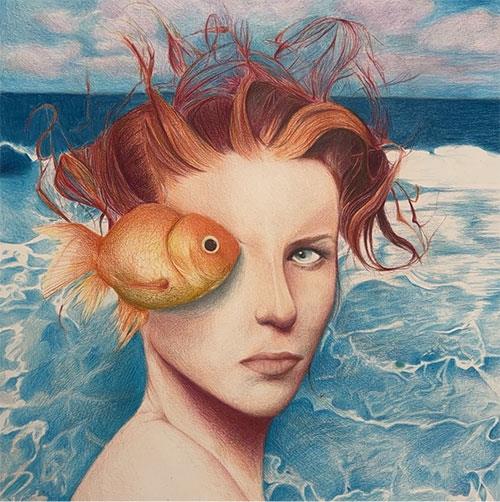
-
Elderly Daylight (Ethan Jerng)—WINNER: GLASSELL SCHOLARSHIP
Elderly Daylight
By ETHAN JERNG
Grade: 8
Quail Valley Middle School, Fort Bend ISD
Teacher: Haoxiang Zhang
-
Out of The Cage (Riya Mahesh)—WINNER: GLASSELL SCHOLARSHIP
Out of The Cage
By RIYA MAHESH
Grade: 8
League City Intermediate School, Clear Creek ISD
Teacher: Eboni Johnson
Texas Art Supply Awards
-
Dear Dad (Emma Jeter)—WINNER: TEXAS ART SUPPLY AWARD
Dear Dad
By EMMA JETER
Grade: 10
Ridge Point High School, Fort Bend ISD
Teacher: Jinny Nguyen (Pham)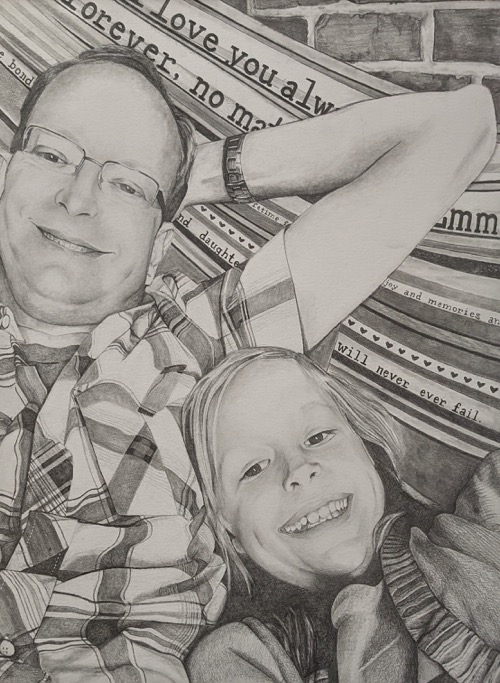
-
Engulfed (Catheryn Liang)—WINNER: TEXAS ART SUPPLY AWARD
Engulfed
By CATHERYN LIANG
Grade: 12
Ping Zhao Art School
Teacher: Ping Zhao
-
immersed in imagination (Anjilea Holm)—WINNER: TEXAS ART SUPPLY AWARD
immersed in imagination
By ANJILEA HOLM
Grade: 10
St. John's School
Teacher: Scott Johnson
-
In My Own World (Sion Joo)—WINNER: TEXAS ART SUPPLY AWARD
In My Own World
By SION JOO
Grade: 12
Glenda Dawson High School, Pearland ISD
Teacher: Teri Zuteck
-
Irugbin ti Sunflower (Nina Liang)—WINNER: TEXAS ART SUPPLY AWARD
Irugbin ti Sunflower
By NINA LIANG
Grade: 10
Ping Zhao Art School
Teacher: Ping Zhao
-
My Friend, Yuechee (Chloe Cheuk)—WINNER: TEXAS ART SUPPLY AWARD
My Friend, Yuechee
By CHLOE CHEUK
Grade: 10
Kinder High School for the Performing and Visual Arts, Houston ISD
Teacher: Daqian Zhang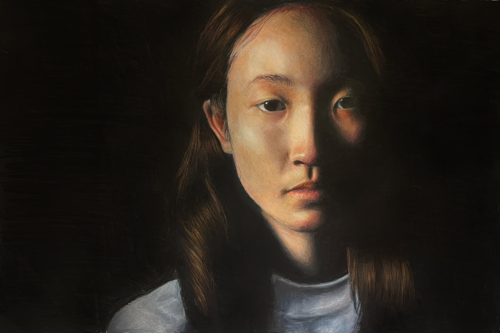
-
Perspective (Sidney Arnold)—WINNER: TEXAS ART SUPPLY AWARD
Perspective
By SIDNEY ARNOLD
Grade: 12
Fort Bend Christian Academy-HS
Teacher: Robert Sanders
-
Red Umbrella (Tiantong Zeng)—WINNER: TEXAS ART SUPPLY AWARD
Red Umbrella
By TIANTONG ZENG
Grade: 11

-
The Speed of Life (Alana Davidson)—WINNER: TEXAS ART SUPPLY AWARD
The Speed of Life
By ALANA DAVIDSON
Grade: 11
St. Agnes Academy
Teacher: Terry Suprean
-
The Ugly Duckling (Elliot Hamlin)—WINNER: TEXAS ART SUPPLY AWARD
The Ugly Duckling
By ELLIOT HAMLIN
Grade: 11
Stratford High School, Spring Branch ISD
Teacher: Lane Smolen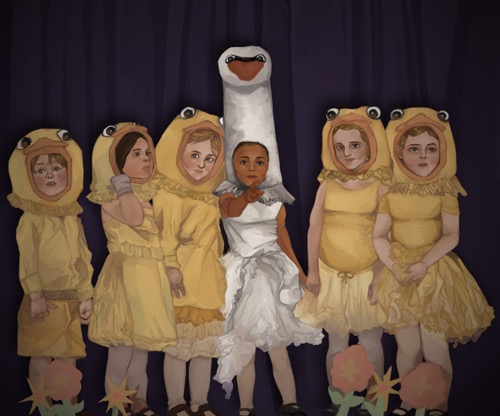
-
And the winners are...
Harris County Department of Education would like to thank all the students who competed in the 2025 Scholastic Art & Writing Awards. Congratulations to this year’s winners in both art and writing! We wish the best of luck to our Gold Key and American Voices and Visions nominees, as their work will automatically be entered into the national competition.
You can use the dropdown filters on each tab of this page to search for a student, view all winners by school or district, and see this year's American Voices and Visions nominees. Additionally, you can find out who won this year’s special awards.
Updated: 3/4/2025 (HCDE Art & Writing Awards winners)
Latest News
-
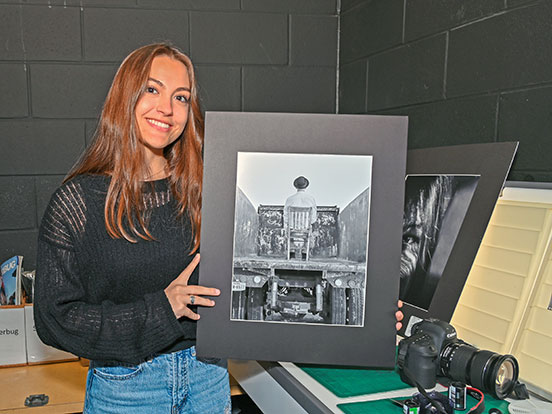
Cy Woods student honored at Carnegie Hall in NYC
Eleri Young's 'Displaced' earns Gold Medal, American Visions Award at Scholastic nationals
-
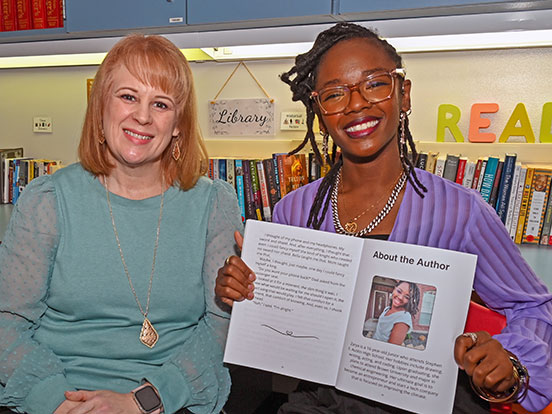
A promising future: Fort Bend student finds confidence through Scholastic success
Senior Zarya Smith's award-winning story highlights themes of belonging and self-discovery
Contact Us
-
Center for Educator Success
Harris County Department of Education
6300 Irvington Blvd.
Houston, TX 77022
Phone: 713-696-1318
Email: scholastictx001@hcde-texas.orgAndrea Segraves
Senior Director of Center for Educator Success

